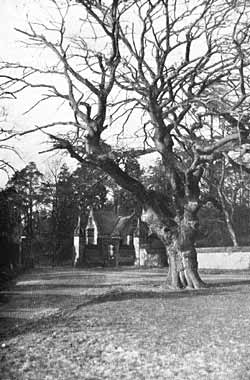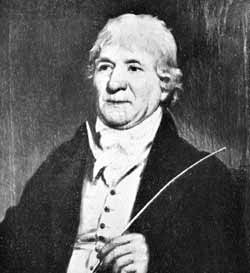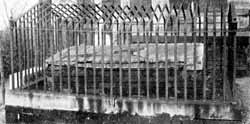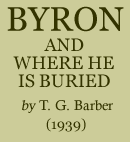< Previous | Contents | Next >
CHAPTER 4.
NEWSTEAD, DULWICH, AND HARROW.
1798—1805.

The entrance to Newstead Priory, and the Pilgrim Oak.

Joe Murray.
It was a long journey from Aberdeen to Newstead, but it must have provided many a thrill for the young traveller. As he approached the home of his ancestors his excitement can have known no bounds. At last he and his mother reached the old toll-bar, and passing under the shade of a large oak, they entered the park by the iron gates. After a drive of a mile through the autumn- tinted woods, Newstead came into view.
Joe Murray was waiting to meet them and conduct them over the Priory. Their first inspection revealed a sad condition of things. The building itself was in ruin, and everywhere indescribable filth and disorder met the eye. What a great disappointment this must have been to both mother and son! To live in a ruin was impossible, and extensive repairs were out of the question for some considerable time. The fortune which the young lord had inherited was in land and not in money. In consequence Mrs. Byron and her ten-year-old son withdrew to Nottingham. Her choice of apartments on Castle Hill was an unhappy one. They were small and dingy, and must have had a most depressing effect on them both. During their stay in Nottingham, George Gordon was sent to a man named Lavender for treatment for his lameness. He suffered untold agony at the hands of this merciless quack.
After a time Mrs. Byron obtained a pension of £300 a year. This made it possible for her to live in London, and in consequence John Hanson, into whose hands the affairs of the young lord had been trusted, made arrangements for him to continue his education at Dulwich under Doctor Glennie. He also prevailed upon Lord Carlisle, whose mother was a sister of Vice-admiral John Byron (“Foulweather Jack”), to become the boy’s guardian.
Doctor Glennie soon formed a liking for his pupil. He admired the pluck he showed in trying to triumph over his physical disability in athletic pursuits. The lad was intelligent, and his width of knowledge for one of such tender years was the wonder of his instructor. He responded to Doctor Glennie’s kindly interest in him, and his three years at Dulwich would have been the happiest years in his life, and productive of much good in the development of his character, had it not been for the folly of his mother, who kept her son away from school for days on end for no reason whatsoever, and did all she possibly could to counteract the good influence which Doctor Glennie was establishing over him.
Lord Carlisle, his guardian, allied himself with the Doctor in endeavouring to resist her influence, but all to no purpose. Mrs. Byron went down to Dulwich repeatedly, and made her visits an opportunity for displaying her uncontrollable temper. Lord Carlisle retired from the conflict, and Doctor Glennie had in the end to admit himself defeated. He found consolation in writing: —
This scathing indictment of her character throws light on the domestic environment of George Gordon in his early years.
In the summer term of 1801 he went to Harrow. He did not take kindly to his new life. Upon discovering that he was woefully backward in the subjects now required, his pride rebelled against the possible humiliation of being placed in a class of boys younger than himself. Doctor Drury, the headmaster, proved himself to be a man of discernment. He had at once perceived the boy’s misgivings, and refrained from placing him in a class until he had had time to make good.
Byron appreciated this kindly consideration, and it never passed from his memory. Some years afterwards he referred to him as “the best and kindest friend he ever had.”
Doctor Drury soon discovered that there was “mind in his eye,” and did not hesitate to tell Lord Carlisle that his ward “had talents which would add lustre to his rank.”
The new boy was constitutionally shy, but his shyness did not stand in the way of his making friends. The Harrow boys soon came under the charm of his personality. There was nothing mean in his character. He was straightforward, brave and chivalrous, and always ready to take up the cudgels on behalf of the weak. To William Harness, who was younger than he, and lame like himself, he said, “Harness, if anyone bullies you, tell me, and I’ll thrash him if I can.”
In games he was always to the fore, and excelled in spite of his lameness.
He had numerous friends to whom he was passionately devoted, but his friendship with Lord Clare was one of the earliest and lasted the longest. Some time after he had left Harrow he wrote “I never hear the word Clare without a beating of the heart.” They met abroad after a separation of seven or eight years. Of this chance meeting—for it was quite unexpected—Byron says “we were but five minutes together, and on the public road, but I hardly recollect an hour of my existence which could be weighed against them.” His friendships were a passion—matters of the utmost intensity—as indeed all friendships are that are deep and true. William Harness wrote of him: “He required a great deal of his friends—not more perhaps than he from the abundance of his love freely and fully gave, but more than they had to return.”

The Pechey Tomb in Harrow Churchyard.
Although he enjoyed the society of his friends, there were occasions when he sought solitude. His favourite place of resort was the churchyard on the top of Harrow Hill, and on a flat tomb, sheltered by the branches of an elm, he loved to lie and read and muse. He refers to it thus:
